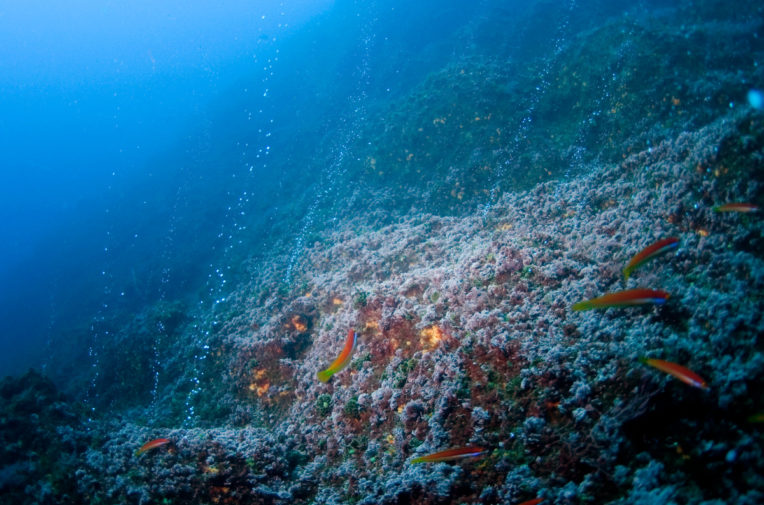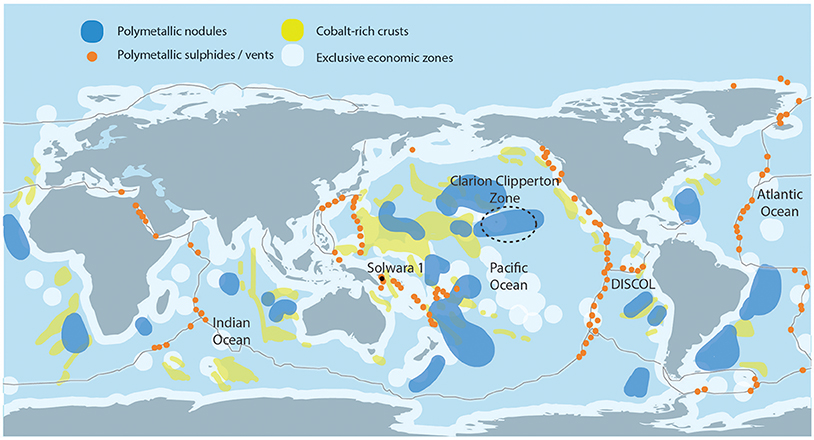Alsof
de mens de wereld nog niet genoeg naar de knoppen heeft geholpen en
nog steeds helpt, kwam ik het hieronder opgenomen artikel tegen,
waarin op het gevaar van 'deep sea mining' (diepzeemijnbouw) wordt gewezen,
bijzonder soorten die daardoor dreigen uit te sterven, soorten die veelal onder aan de
voedselketen staan, maar daarom niet minder belangrijk zijn voor het
totale ecosysteem van oceanen. (zo zijn een paar walvissoorten echte diepzeeduikers)
Zoals
je wellicht weet, elke manier van delving, of dat nu door graven
gebeurt, door mijnbouw, dan wel middels olie en gaswinning, brengt
vervuiling met zich mee, in de goudwinning is het gevaarlijkst
gebruikt middel zelfs kwik, wat al jaren te vinden is in Surinaamse
rivieren.......
Uiteraard
hoe dieper hoe moeilijker en gevaarlijker diverse soorten van delving
zijn, of je het nu over mijnbouw hebt zoals we die kennen, met alle
gevaren voor de arbeiders (kompels) van dien, of over diepzeeboringen
waar het zeeleven het slachtoffer is.....
De
gevaren die kleven aan het boren in diepzeeën, of op welke andere
manier dan ook delven van grondstoffen is vooral een gevaar voor de
bestaande bijzondere dieren (die we veelal niet eens kennen...) en de
dieren die daarvan afhankelijk zijn en vervolgens de dieren die daarvan weer verantwoordelijk zijn (enz.)..... Neem de ramp in de Golf van Mexico met het door BP gebruikte Deepwater Horizon platform (de naam alleen al....) Nog steeds is in
het grootste deel van het besmette gebied een visverbod van kracht en veel gedupeerden
wachten nog steeds op een fatsoenlijke vergoeding.......
Onbegrijpelijk
dat GB samenwerkt met wapenfabrikant Lockheed Martin voor het delven
van grondstoffen onder oceanen en zeeën...... Alsof Lockheed Martin
als wapenfabrikant niet al één van de grote verantwoordelijken is
voor het om zeep helpen van ons klimaat en het vervuilen van lucht,
bodem, grond- en oppervlaktewater, dit nog naast het vermoorden van miljoenen
mensen in de illegale oorlogen die de VS met haar oorlogshond NAVO
voert in landen waar de VS noch andere NAVO-lidstaten ook maar iets
te zoeken hebben......
Het
volgende artikel komt van GreenPeace (Unearthed):
UK government warned deep sea mining could cause ‘potential extinction of unique species’, documents reveal
The
UK’s joint project with American military firm Lockheed Martin is
the largest in the world but poses risks to deep sea ecosystems

Hydrothermal
vents at Dom João De Castro in the central north Atlantic Ocean
(2006) Photo: Greenpeace, Gavin Newman.
Deep
sea mining could lead to “the potential extinction of unique
species which form the first rung of the food chain,” according to
a report commissioned by an arm of the British government.
‘The
Subsea Mining Capability Statement’ – obtained by Unearthed using
freedom of information rules – was produced by the National Subsea
Research Initiative in 2017 and circulated amongst the UK
government’s deep sea mining working group at key stakeholder
meetings.
The
British government has licenses for exploratory mining of
polymetallic nodules in the Pacific Ocean as part of a joint venture
with UK Seabed Resources, a subsidiary of US defence firm Lockheed
Martin.
The
statement’s environmental warnings echo those heard from the
scientific community, many of whom fed into the UK parliament’s
‘sustainable seas’ inquiry which concludeddeep
sea mining “would have catastrophic impacts on the seafloor site
and its inhabitants.”
What
is deep sea mining?
The
process of gathering the minerals that lie atthe bottom of the
ocean – whichincludes
cobalt, a key ingredient in the batteries that power smartphones,
laptops and electric cars – by deploying massive remote controlled
vehicles to hoover up mineral deposits from the seabed floor
It
comes as many in the scientific community have
been sounding the alarm over
the risks posed by deep sea mining, though some cautioned that not
enough is yet known to justify the claim about the extinction of key
species in the capability statement. That, in turn, has led to calls
for further research.
Kerry
McCarthy, a Labour MP who sits on the Environmental Audit Committee,
told Unearthed: “As the fragility of our planet and its
ecosystems becomes starkly more apparent, it’s difficult to believe
the Government is continuing to promote deep-sea mining in the full
knowledge it could pose risks to unique species that are integral to
the food chain.”
David
Rennie, head of Oil and Gas at Scottish Enterprise, the government
agency that commissioned the Subsea capability statement,
told Unearthed: “This report was commissioned to
highlight the market potential in a range of sectors such as
aquaculture and marine renewables, that Scotland’s subsea
capability could be appropriate for in future market activity.
We regularly undertake research into markets to understand the
potential these may have for Scotland’s businesses and economy.
“As
yet we have not made any decisions, or progressed any activity, on
how we might develop seabed mining. Other sectors such as marine
renewables and aquaculture are likely to offer more immediate
opportunities and any significant developments in seabed mining are
likely to be some years off.”
A
UK government spokesperson said: “The UK continues to press
for the highest international environmental standards, including on
deep sea mineral extraction. We have sponsored two exploration
licences, which allows scientific marine research to fully understand
the effects of deep sea mining and we will not issue a single
exploitation licence without a full assessment of the environmental
impact.”
Here
is the industry report commissioned by the government agency Scottish
Enterprise:
The
distant ocean
Deep
sea mining has yet to start commercially anywhere in the world, but
environmental concerns are based – in part – on the scale of the
projects under consideration, with the UK set to play a leading role
in the industry.
Mining
exploration licenses have been distributed to 22 projects by the
International Seabed Authority (ISA), the intergovernmental body
responsible for regulating resource extraction in the high seas. Each
of the licenses must be sponsored by a national government.
The
territories licensed – spanning the polymetallic nodules south of
Hawaii and the cobalt-rich crusts in the Asian Pacific region to the
sulphide deposits around the Atlantic Ocean’s Lost City and even
more nodules in the Indian Ocean – total an area twice the size of
Ukraine.
An Unearthed analysis
of ISA data shows the UK’s venture with Lockheed Martin is the
single biggest project in the world, covering an expanse off Mexico
larger than England itself.
The
Chinese government, which holds 263 licenses with 2 different
companies, controls the most territory, with the UK government at
number 2. The country is reportedly leading efforts to agree on a law
allowing mining by 2020.
The
United States does not hold licenses since it has not yet ratified
the Law of the Sea Convention (1994) and is thus not a member of the
ISA.

(de in het origineel opgenomen afbeelding vind ik onduidelijk, vandaar deze)
Environmental
fears
Deep
sea mining at this scale has prompted serious concerns from
scientists who warn that far too little is known about the habitats
it will disrupt. Many are calling for a years-long moratorium whilst
research takes place.
Rachel
Mills, Professor of Ocean Chemistry at the University of Southampton,
told Unearthed: “We have been interested in mining deep
sea floor since the 1970’s and scientists have long argued that
small scale experiments should be carried out to understand the
impacts of potential extraction techniques.
“What
we know is that long after these experiments were conducted, the
seafloor is still scarred, and devoid of the hard nodule substrate
required to support the seafloor communities. What we don’t
know is what impact this has on the deepest abyssal plains on the
vast ocean floor.”
Though
she said some scientists believe there is already requisite
information to begin mining, Professor Mills called on government to
“abide by the precautionary principle,” arguing that “we are a
long way off from knowing how to conduct adequate and comprehensive
environmental impact assessments.”
“If
there’s one thing we’ve learned from mining on land it’s that
you need to know about the environmental impact on different scales
and over time, and we just don’t know enough yet.”
Jessica
Battle, who works on ocean governance for environmental group WWF,
made a similar call for an extended moratorium on deep sea mining
until we better understand what impact it could have.
“Scientific
understanding of the ecosystems in the deep sea is still in its
infancy, so much could be destroyed before we even know what’s down
there, or the benefits that these fragile ecosystems provide to the
planet and humanity. We certainly do not think that the case has been
made for seabed mining to progress. We urge all actors involved in
consideration of this form of exploitation to hold back and allow the
science and conservation of these ecosystems to catch up.”
These
concerns are well-known to the officials who lead the ISA, including
its secretary general Michael Lodge, who wrote
in 2013 that
some “ecosystems may never recover” from deep sea mining
activity.
==================================Overigens ook Nederland houdt zich bezig met onderzoek naar diepzeemijnbouw.......

Geen opmerkingen:
Een reactie posten